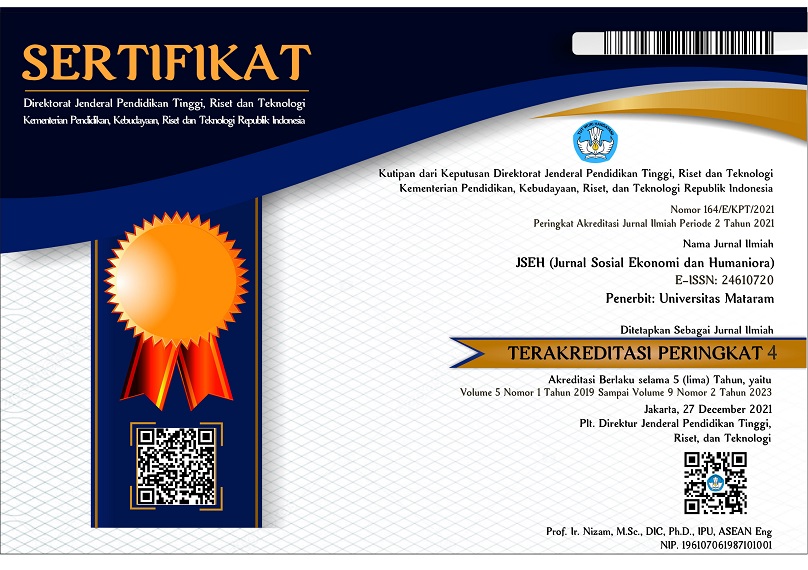Peran Locus Of Control Internal Terhadap Kemampuan Pemecahan Masalah Akademik Pada Mahasiswa Pengurus Organisasi
DOI:
https://doi.org/10.29303/jseh.v8i4.159Keywords:
Internal Locus of Control, Academic Problem Solving SkillAbstract
This study aims to examine the relationship between internal locus of control and academic problem solving skill in student organization. The hypothesis in this study is that there is a positive relationship between internal locus of control and the ability to solve academic problems in organizational students. Research respondents (N = 200) are active students, are administrators or active members in community service and are aged 17-22 years. Collecting data using academic problem solving skill scale and internal locus of control scale. The analysis in this study was tested with a correlation technique, namely Spearman carried out using the help of SPSS for Windows version 22.00. The results of the analysis show that there is a significant positive relationship between internal locus of control and academic problem solving abilities in student organizations.
References
Ai, A. L., Peterson, C., Rodgers, W., & Tice, T. N. (2005). Effects of faith and secular factors on locus of control in middle-aged and older cardiac patients. Aging & mental health, 9(5), 470–481.
Alfiana, A. D. (2013). Regulasi diri mahasiswa ditinjau dari keikutsertaan dalam organisasi kemahasiswaan. Jurnal Ilmiah Psikologi Terapan, 1(2), 245–259.
Arifin, M. (1994). Psikologi dakwah: Suatu pengantar studi. Bumi Aksara. Arifin, S. (2014). Mahasiswa dan Organisasi. Jakarta: Grafindo Persada.
Arthur, S. R., & Emily, S. R. (2010). Kamus psikologi. Yogyakarta: Pustaka Pelajar.
Benson, B. (2012). Locus of control and adherence to diabetic regimen among male and female patients with diabetes. Sacred Heart Nursing College, Madurai.
Brosschot, J. F., Benschop, R. J., Godaert, G. L., Olff, M., De Smet, M. B. M., Heijnen, C. J., & Ballieux, R. E. (1994). Influence of life stress on immunological reactivity to mild psychological stress. Psychosomatic medicine, 56(3), 216–224.
Çakır, M. (2017). Investigating prospective teachers’ perceived problem-solving abilities in relation to gender, major, place lived, and locus of control. Universal Journal of Educational Research, 5(6), 1030–1038. https://doi.org/10.13189/ujer.2017.0506
Dariyo, A. (2003). Psikologi perkembangan dewasa muda. Jakarta: Gramedia Widiasarana Indonesia.
Davidoff, P. (1965). Advocacy and pluralism in planning. Journal of the American Institute of planners, 31(4), 331–338.
Dijkstra, M. T. M., Beersma, B., & Evers, A. (2011). Reducing conflict-related employee strain: The benefits of an internal locus of control and a problem- solving conflict management strategy. Work & Stress, 25(2), 167–184. https://doi.org/10.1080/02678373.2011.593344
Duffy, K. G., & Atwater, E. (2005). The psychology of health, ilness and medical care. Pacific Grove, California: Brooks. Cole Publishing Company
Febrianti, Y. P., Nuqul, F. L., & Khotimah, H. (2020). Academic hardiness pada mahasiswa aktivis dan mahasiswa yang bekerja. Psyche 165 Journal, 13(1), 79– 87.
Feist, G. J. (2006). How development and personality influence scientific thought, interest, and achievement. Review of General Psychology, 10(2), 163–182.
Heppner, P. P., & Petersen, C. H. (1982). The development and implications of a personal problem-solving inventory. Journal of counseling psychology, 29(1), 66.
Holidun, H. (2017). Analisis kemampuan pemecahan masalah matematis peserta didik kelompok matematika ilmu alam (mia) dan ilmu-ilmu sosial (iis) kelas xi man 1 bandar lampung ditinjau dari minat belajar matematika. UIN Raden Intan Lampung.
Hornsby, G., Gleason, B., Wathen, D., Deweese, B., Stone, M., Pierce, K., Wagle, J., Szymanski, D. J., & Stone, M. H. (2017). Servant or service? The problem and a conceptual solution. Journal of Intercollegiate Sport, 10(2), 228–243.
Hunsaker, A. (2005). Community Work & Problem Solving. London: McMillan.
Iskender, M., & Akin, A. (2010). Social self-efficacy, academic locus of control, and internet addiction. Computers & Education, 54(4), 1101–1106.
Jones, B. K., Monks, B. R., Liebhaber, S. A., & Cooke, N. E. (1995). The human growth hormone gene is regulated by a multicomponent locus control region. Molecular and cellular biology, 15(12), 7010–7021.
Konan, N. (t.t.). Relationship between locus of control and problem-solving skills of high school administrators. 9.
Kreitner, R., & Kinichi, A. (2003). Organization Behavior; frist edition. The Mc Graw–Hill Companies, Inc, Diterjemahkan oleh Erly Suandy.
Lachman, M. E. (1986). Locus of control in aging research: A case for multidimensional and domain-specific assessment. Psychology and aging, 1(1), 34.
Lefcourt, H. M. (1976). Locus of control and the response to aversive events.Canadian Psychological Review/Psychologie Canadienne, 17(3), 202.
Legerski, E. M., Cornwall, M., & O’Neil, B. (2006). Changing locus of control: Steelworkers adjusting to forced unemployment. Social forces, 84(3), 1521–1537.
Kiong, T. T, Nasir, N.A, Azid, N, Mohamad, M. M., Chang & Singh. Issues and solutions on inventive problems-solving skills (IPSS) in invention cours. Cakrawala Pendidikan, 41(2), 468-480. https://doi.org/10.21831/cp.v41i2.43499
Ormrod, D., & David, O. (2003). The rise of commercial empires: England and the Netherlands in the Age of Mercantilism, 1650-1770 (Vol. 10). Cambridge University Press.
Papalia, D. E., Olds, S. W., & Feldman, R. D. (2007). Human development. McGraw-Hill.
Petri, W. (1981). Locus of control: Dimension of personality. New York: Wiley. Phares, E. J. (1976). Locus of control in personality. General Learning Press.
Piaget, J. (1976). Piaget’s theory. Dalam Piaget and his school (hlm. 11–23). Springer
Rotter, J. B. (1990). Internal versus external control of reinforcement: A case history of a variable. American psychologist, 45(4), 489.
Saepuloh, D. (2017). Pengaruh keaktifan mahasiswa dalam organisasi terhadap prestasi mahasiswa di fkip universitas islam syekh-yusuf tangerang. 25(2), 13.
Santrock, J. W. (2010). Educational Psycology, Edisi 5. Dallas: McGraw-Hill Company, Inc.
Silalahi, V. (2009). Hubungan locus of control dengan perilaku kesehatan pada masyarakat perdesaan. Skripsi Fakultas Psikologi Universitas Sumatera Utara.
Siswanto, H. B. (2007). Manajemen dan Organisasi. Jakarta: Bumi Aksara.
Siswono, T. Y. E., & Novitasari, W. (2007). Meningkatkan kemampuan berpikir kreatif siswa melalui pemecahan masalah tipe” what’s another way”. Jurnal Trasformasi, 1(1), 1–13.
Downloads
Published
How to Cite
Issue
Section
License
Copyright (c) 2022 Neni Widyayanti, Hazanariah Hazanariah, Nadea Zulfa Khairunnisa

This work is licensed under a Creative Commons Attribution-NonCommercial 4.0 International License.








